We are family: Reconciliation Conference unites the hearts and spirits of Muslims
By Nisa Islam Muhammad -Staff Writer- | Last updated: Sep 23, 2014 - 10:18:46 PMWhat's your opinion on this article?
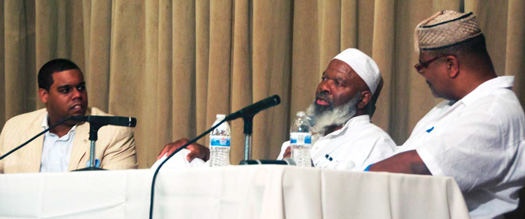
Student Minister Carlos Muhammad, Imam Siraj Wahhaj and Imam Mikal Shabazz served as panelists at the Reconciliation Conference, held Sept. 5-7, at Mosque Masjidullah in Philadelphia.The conference built kinship and history between the followers of W.D. Mohammed and the Honorable Minister Louis Farrakhan. Photos: Understanding Allah
|
PHILADELPHIA (FinalCall.com) - In the City of Brotherly Love, a city with a long history of Islam, Muslims recently shared and took steps to reconcile and find ways to work together. Over an emotional weekend, the family of Muhammad embraced and enjoyed the wisdom and spirit of Allah (God) and an overriding spirit of love and unity.
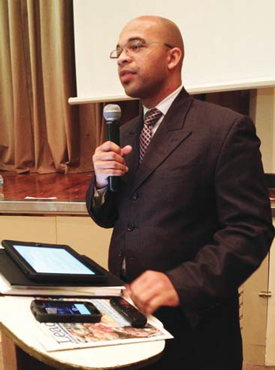
Imam Sultan Rahman Muhammad
|
Both communities originated from the same teacher, Mr. Muhammad.
Muslims from both communities came together at Masjidullah, a major Muslim facility, here Sept. 5-7 for the “Reconciliation Conference: The Next Steps.”
The positive and enlightening weekend followed a message from Minister Farrakhan earlier this year at Masjidullah at a fundraising dinner. His theme was reconciliation.
Minister Farrakhan’s message at the June pre-Ramadan banquet encouraged reconciliation between Muslim communities. “We who came apart for whatever reason, in due season, would find our way back to each other, because we are Muslims. And even though we had serious disagreements, it never caused us to shed the precious blood of another Muslim. The whole world of Islam can learn from our example,” said Minister Farrakhan.
The weekend built on sincere and powerful feelings of connection and kinship, feelings of a shared history, a shared destiny and a shared duty to help heal suffering.
“We have to look at the Honorable Elijah Muhammad again,” said Imam Siraj Wahhaj, during the opening plenary session. He delivered the same message at traditional congregation prayer service that opened the gathering. “This is coming from a Sunni Muslim, what I’m saying is what I believe. If I don’t believe it, I’m not saying it,” said the respected imam whose community is based in New York.
“You can’t argue with the Nation of Islam’s ability to relate to our people. Sunni Muslims can’t do it like that. What do they have? What do Sunni Muslims have? Put them together and the whole world will change … if we come together, watch what happens,” he said.
The imam, who was on his way to Australia, also shared his belief that the Hon. Elijah Muhammad planted in the minds of Muslims seeds for the full expression of Islam. Blacks were sick and hated themselves so the teachings of Master Fard Muhammad, Mr. Muhammad’s teacher, must be examined under the degrading circumstances that Blacks faced, he said.
Nation of Islam historical archivist Carlos Muhammad said, “The root of (Muslim) success is the Holy Qur’an. The spirit of Allah united us from all walks of life and all backgrounds. Our unity is more powerful than anything. Prophet Muhammad (Peace Be Upon Him), was the Messenger of Allah to you all. Minister Farrakhan has said that our communities are really one community. We come from the same womb.”
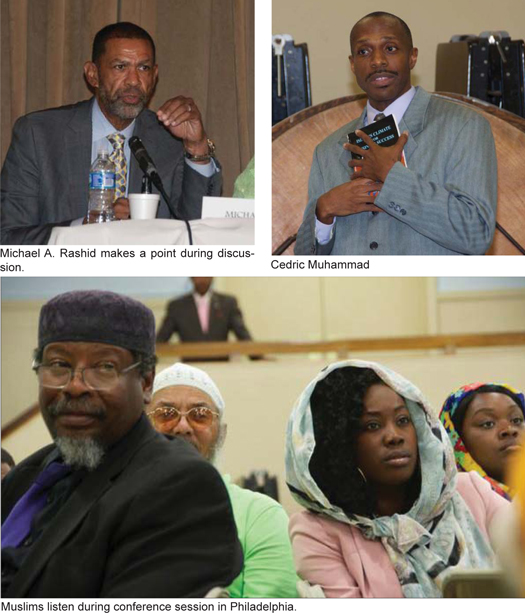
Photo: Understanding Allah
|
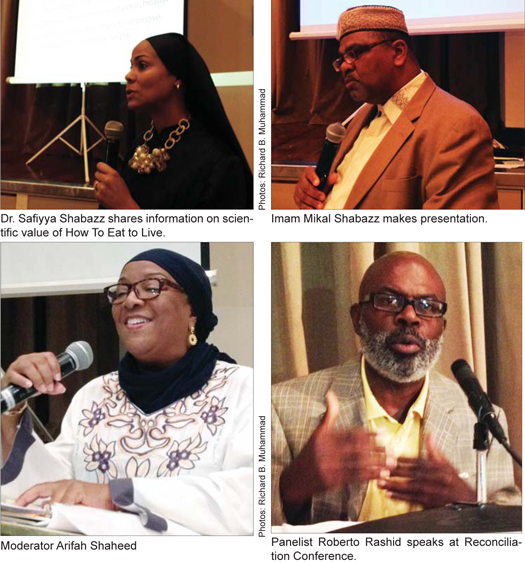
|
Sessions devoted to important topics
The weekend included workshops that addressed Human Growth and Development, Education, Economics, Politics and Media.
“The Honorable Elijah Muhammad wanted us to be the Muslims of the first order. We’re celebrating our 35th year of The Final Call. We owe so much to our predecessors. Personally I have never seen a division in our community. For The Final Call, the Muhammad Speaks is the standard by which we judge ourselves. That’s our legacy,” said Richard B. Muhammad, editor in chief of The Final Call, during the Media panel. Muhammad Speaks was the highly influential weekly newspaper published by the Nation in the 1960s and 1970s.
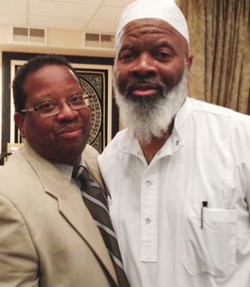
Final Call Editor Richard B. Muhammad with Imam Wahhaj.
|
Our unity is not an academic exercise or philosophical argument; it is essential for the survival of our people, said editor Muhammad.
Many welcomed seeing Mr. Muhammad and Ayesha K. Mustafa, editor of The Muslim Journal in the same meeting. The Muslim Journal is the direct descendent of the Muhammad Speaks.
“I’m very appreciative of Brother Richard. Richard is special. There is no divide in our history,” she said. “We’ve had our differences between the Nation of Islam and Imam Warith Deen Mohammed’s community but we’ve never drawn blood. We don’t have that sin on us.”
The two weekly newspapers already share content and agreed to continue working together. During a breakout session, a joint quarterly publication was one of the ideas that emerged.
Both publications must be strong, independent and tell the true story of Islam and our community, said the respective editors.
“I went to Harvard and USC,” said Michael Rashid, former president and CEO of AmeriHealth during the Education panel. “The best thing that ever happened to me was Al-Islam and it starts with the teachings of the Honorable Elijah Muhammad. We stand on the great tradition of Islamic education that goes back to Muhammad University of Islam.”
Panelists agreed that the economic strength of Black America must be harnessed to create greater opportunity and to solve serious problems.
The panelists and participants prayed together at the designated times, ate together, embraced and warmly received one another. Every panel included men and women and representatives of both communities as ideas and history were exchanged. There was learning on both sides, but it was joyous learning. There was even an evening of line dancing to close the Saturday session.
Traditional prayers were led by Imam Mikal Shabazz, the imam over Masjidullah; Carlos Muhammad who is also student minister of the Nation’s Muhammad Mosque No. 6 in Baltimore and other Muslims.
Economist Cedric Muhammad spoke on the need for an Islamic economic system.
“There is no economic system that isn’t tied to land. Prophet Muhammad (Peace Be Upon Him) was a herdsman. God chose prophets that were herdsman. … Prophet Muhammad set up markets, he united the merchants and entrepreneurs from Mecca and Medina. Why is the cow so important? There are 80 products from the cow … there are over 200 references to food in the Qur’an. Land is critical to man and farming is rooted to merchant ship,” he said.
Harry Muhammad shared information about the Nation’s ABLE Fish program, which provides quality fish at a wholesale price to mosques around the country. The mosques make money and those who sell the fish at retail prices make money, he said. The current program is modeled after the legendary importing business the Nation of Islam engaged in during the 1970s.
Dr. Akosua Ali Sabree is the founder of the Amadi Universal Light Mission. Her message spoke to the oft-neglected mental state of Black Americans.
“Our mental state keeps us from valuing our spiritual state and our health state. We have mental disorders. Ferguson is happening every day. We live with persistent anxiety. We have a delusion of inclusion. We think the laws are just all the way around. Delusion is a mental disorder,” she said.
She and other panelists talked about the need for strong institutions to address the needs of Black America in a society still plagued by racism, disparity and division. Those institutions are needed to tackle disparity seen across the board in Black lives, they said.
Imam Abdulaleem told the audience there is more political strategy in the Qur’an than any other book. “How do other people come to our community and do so well while we’re still suffering? We must have a continual struggle to establish God’s way on earth. Every generation should be better than the one before,” he said.
Islam: The social solution
“The challenge is for us to figure out how we can positively affect the quality of life for people in the community,” Imam Shabazz said during a Saturday session.
The median income for Blacks in Philadelphia is $26,738 which is $15,000 less than Whites in the city, he noted. There is a $25,000 gap when married versus single parent families are examined but married Black couples are closer to the average income of White married families, the imam said.
Black married couples earn 77 percent of the income of White married couples, Imam Shabazz added.
The Black community suffers from high infant mortality rates and a disparity in teenage pregnancies, he continued. So morality, or the lack of morality, has real consequences, Imam Shabazz noted.
We are in a war against poverty, injustice and ignorance as well as for self-correction, he said.
“We hurl truth against falsehood and knock out its brains, so we need the best information which we have in the Holy Qur’an so we need to fight this war,” he said.
The opening panel discussion was devoted to Human Growth and Development and tackled spiritual, mental and physical health. The goal of the session was to create and maintain a holistic approach to spiritual, mental, physical health and wellness.
Panelists included Imam Roberto Rashid of Masjidullah, who made a presentation on spiritual development; Dr. Ali-Sabree of the Amadi Wellness Center dealt with mental health and Dr. Safiyya Shabazz, M.D., dealt with How To Eat To Live, written by the Hon. Elijah Muhammad, science and its ramifications today.
Among her patients alone, if 128 patients smoke a half pack of cigarettes a day and pay $5.50 a pack that equals $128,480, said Dr. Shabazz, whose Fountain Medical Associates practice is based in Philadelphia.
The second panel, “Education: We Must Educate Our Own,” was convened to review the educational offerings at Masjidullah and Muhammad Mosque No. 12 and identify the education needs of the communities and students in the city of Philadelphia.
Panelists included Michael A. Rashid of Masjidullah; Christine Thomas Wiggins, independent educator; Minnette Taylor of Masjidullah Early Child Care Academy; Yvonne Muhammad of Education is the Key Learning Center; Nafeesa A. Malik of Madressatul Islamiyyah; G. Shakir Abdulijaleel of the Masjidullah apprenticeship program and Imam Shabazz.
“We are behind this 100 percent,” said Imam Sultan Muhammad of the Nation of Islam’s Chicago headquarters Mosque Maryam. “We must take the attitude of the servant. Let’s establish the will of Allah for the betterment of our people. Let us connect as Muslims. This conference will expand. Masjidullah is answering the call of Allah.”
Purchased in May 2013 for $1 million and with nearly another $1 million for renovations, Masjidullah is the largest masjid in the Tri-State, Pennsylvania, New Jersey, Delaware region.
The campus includes a 14-room office building and a one-quarter acre parking lot. The “musallah,” or prayer area holds 1,200 people. In the same building is a school with 14 classrooms, a banquet hall and an industrial kitchen capable of providing food for special events. The building has a stage that allows for small shows, spoken word performances and jazz concerts.
The purchase of the 30,000 square foot former synagogue by members of Masjidullah returned the Philadelphia-based masjid to its roots that include being the main “stabilizing” force in whatever community it took up residence.
Philadelphia political strategist Joe Certaine participated in the discussion of politics and social media guru Jesse Muhammad talked about the proper use of the popular networks to achieve meaningful things and promote progress in society.
Akbar Muhammad, international representative of the Nation of Islam, closed the conference from Ghana with a message delivered via Skype. “Our unity can be a light for the Muslim world. We must keep going. Don’t get sidetracked. The world of Islam is in trouble and needs a light,” he noted.
“Learn to close the door on things from yesterday and build a better tomorrow. Let’s work on this unity. Let’s be a light for the Muslim world that is sinking in darkness. Let’s not squander this opportunity. Our young people need this,” said Mr. Akbar Muhammad.
(Final Call staff contributed to this report. Nisa Islam Muhammad and Arifa Shaheed moderated the conference. Please see next page for more photos from the conference.)
INSIDE STORIES AND REVIEWS
-
-
About Harriett ... and the Negro Hollywood Road Show
By Rabiah Muhammad, Guest Columnist » Full Story -
Skepticism greets Jay-Z, NFL talk of inspiring change
By Bryan 18X Crawford and Richard B. Muhammad The Final Call Newspaper @TheFinalCall » Full Story -
The painful problem of Black girls and suicide
By Charlene Muhammad -National Correspondent- » Full Story -
Exploitation of Innocence - Report: Perceptions, policies hurting Black girls
By Charlene Muhammad -National Correspondent- » Full Story -
Big Ballin: Big ideas fuel a father’s Big Baller Brand and brash business sense
By Bryan Crawford -Contributing Writer- » Full Story






 Click Here Stay Connected!
Click Here Stay Connected!








